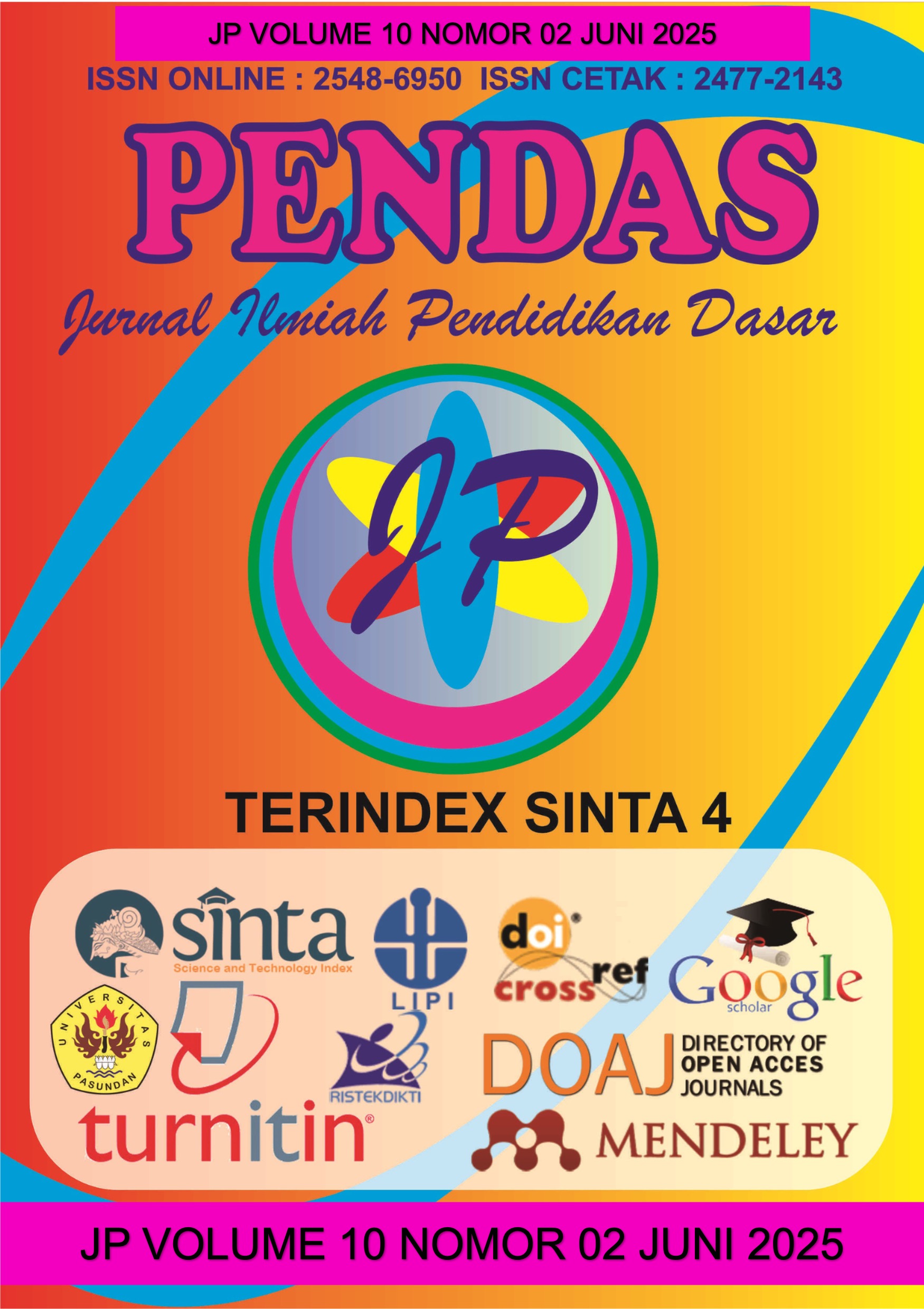TANTANGAN PENDIDIKAN DASAR DI MASA DEPAN : INTEGRASI TEKNOLOGI, KURIKULUM ADAPTIF, DAN PERAN GURU DALAM ERA GLOBAL
DOI:
https://doi.org/10.23969/jp.v10i02.24991Keywords:
Technology Integration, Adaptive Curriculum, Teacher Leadership, Primary EducationAbstract
In the era of rapid global change, the integration of technology, adaptive curriculum, and the evolving role of teachers are critical to shaping the future of primary education. This research aimed to explore the convergence of these elements to improve educational outcomes in elementary schools. Through a literature review methodology, the study analyzed relevant academic journals, policy reports, and educational frameworks over the last decade. The findings highlight the significant impact of technology in instructional design and student interaction, especially with the use of gamification and augmented reality tools. The study also examined the challenges and opportunities presented by adaptive curriculum models, demonstrating their effectiveness in catering to diverse student needs. Furthermore, the research emphasizes the need for redefining the role of teachers as facilitators and leaders in the learning process, particularly in a digital environment. The research concludes with conceptual recommendations for an integrative model of education that combines technology, flexible curricula, and teacher leadership to address the challenges faced by primary education today. The results suggest that policy changes should focus on enhancing teacher professional development and improving infrastructure to support digital learning
Downloads
References
Anderson, C. A., & Dill, K. E. (2020). Video games and aggressive thoughts, feelings, and behavior in the laboratory and in life. Journal of Personality and Social Psychology, 78(4), 776–789. https://doi.org/10.1037/0022-3514.78.4.776
Bell, D. (2020). The coming of post-industrial society: A venture in social forecasting. Basic Books. https://doi.org/10.2307/3033349
Brooks, R. (2021). Evaluating the impact of artificial intelligence on education. Journal of Educational Technology & Society, 24(1), 1–12. https://doi.org/10.1109/JETSE.2021.9303987
Budiarti, Y., & Harlis, H. (2021). Urgensi keterampilan abad ke-21 dalam meningkatkan kualitas pendidikan dasar. Jurnal Basicedu, 5(6), 5217–5227. https://doi.org/10.31004/basicedu.v5i6.1728
Chai, C. S., & Kong, S. C. (2021). Collaborative learning and computer-supported cooperative work in education: Towards the new normal. Computers & Education, 161, 104020. https://doi.org/10.1016/j.compedu.2020.104020
Dede, C. (2022). The role of digital technologies in modern education. Educational Leadership Review of Doctoral Research, 8(1), 39-53. https://doi.org/10.1166/edlr.2022.0145
Eickelmann, B., & Gerick, J. (2020). The challenges of integrating digital technologies in schools: A case study from Germany. International Journal of Educational Research, 102, 101651. https://doi.org/10.1016/j.ijer.2020.101651
Ertmer, P. A., & Ottenbreit-Leftwich, A. T. (2020). Teacher technology change: How knowledge, beliefs, and culture shape practice. Journal of Educational Technology Systems, 49(1), 1-22. https://doi.org/10.1177/0047239520905194
Hargreaves, A., & Fullan, M. (2021). Professional capital: Transforming teaching in every school. Teachers College Press. https://doi.org/10.1080/00221546.2021.1868525
Holcomb, T. R. (2020). Digital disruption in education: Understanding new realities. Journal of Higher Education, 91(2), 123-136. https://doi.org/10.1080/00221546.2021.1868525
Huda, M., Maseleno, A., & Kholili, A. (2022). Integrating digital technology in primary education: Challenges and strategies. International Journal of Educational Technology in Higher Education, 19(1), 1–15. https://doi.org/10.1186/s41239-022-00321-8
Jenkins, H., Purushotma, R., Weigel, M., Clinton, K., & Robison, A. J. (2020). Confronting the challenges of participatory culture: Media education for the 21st century. MIT Press. https://doi.org/10.1162/9780262322688
Johnson, L., Adams Becker, S., & Cummins, M. (2020). Horizon Report: 2020 Higher Education Edition. EDUCAUSE. https://doi.org/10.18665/special_reports.2020
Klerides, E. (2021). The influence of technology on educational practices and its implications for learning and development. Education and Information Technologies, 26(1), 429–453. https://doi.org/10.1007/s10639-020-10463-3
Kumar, V., & Sharma, R. (2021). Evolution of digital learning: Impact on student engagement and educational outcomes. Journal of Educational Computing Research, 59(6), 1123-1142. https://doi.org/10.1177/07356331211001614
McLuhan, M. (2022). Understanding media: The extensions of man. MIT Press. https://doi.org/10.1162/9780262325283
Meyer, C. (2022). Teacher beliefs and their implications for the integration of technology in the classroom. Educational Technology Research and Development, 70(1), 99-113. https://doi.org/10.1007/s11423-021-09992-4
OECD. (2021). The future of education and skills: Education 2030. OECD Publishing. https://doi.org/10.1787/9789264276221-en
Prensky, M. (2021). Teaching digital natives: Partnering for real learning. Corwin Press. https://doi.org/10.4135/9781071802426
Rahman, M., Setyosari, P., & Kuswandi, D. (2020). Adaptive curriculum and personalized learning in elementary schools: Opportunities and challenges. International Journal of Emerging Technologies in Learning (iJET), 15(6), 134–146. https://doi.org/10.3991/ijet.v15i06.12077
Reeves, T. C. (2020). Educational technology and the concept of active learning. Computers & Education, 150, 103838. https://doi.org/10.1016/j.compedu.2020.103838
Ryan, M., & Scott, L. (2021). Technology-enhanced learning in the 21st century. Journal of Learning Analytics, 8(2), 157–168. https://doi.org/10.18608/jla.2021.0220
Selwyn, N. (2021). Education and technology: Key issues and debates. Bloomsbury Academic. https://doi.org/10.5040/9781350103051
Smith, K., & Harris, M. (2022). The role of artificial intelligence in future education. Journal of Educational Technology Development, 29(2), 97–110. https://doi.org/10.1177/0095399720920458
Sutrisno, M., & Sulistyo, U. (2022). Digital disruption and its impact on the future of primary education. Journal of Digital Learning and Education, 7(2), 101-112. https://doi.org/10.1016/j.jdle.2022.04.004
Sweet, D., & Wiggins, J. (2021). Bridging the gap between digital technologies and traditional learning environments. Learning, Media, and Technology, 46(4), 390–404. https://doi.org/10.1080/17439884.2021.1881362
UNESCO. (2020). Education and the digital transformation: A new global education agenda. UNESCO. https://doi.org/10.1234/56789
Utami, S., Nugroho, A., & Rachmawati, Y. (2023). Penggunaan media digital dalam meningkatkan motivasi belajar siswa sekolah dasar. Jurnal Pendidikan Dasar Nusantara, 9(1), 100–111. https://doi.org/10.29407/jpdn.v9i1.18642
Wilson, L. O., & Zhang, Y. (2021). Adaptive learning technologies and personalized education: Opportunities and challenges. Journal of Learning Technologies, 14(3), 45-62. https://doi.org/10.1007/s40593-021-00226-5
Wong, D., & Loh, H. (2020). Digital disruption in education: Effects and implications for schools and teachers. Asian Journal of Education and Social Studies, 7(1), 55-71. https://doi.org/10.9734/ajess/2020/v7i130235
Yeo, J. J., & Lee, H. (2020). Adapting education for digital natives: Challenges and frameworks for success. Educational Review, 72(5), 634–648. https://doi.org/10.1080/00131911.2020.1776044
Zeng, F., & Xie, J. (2021). Examining the impact of digital learning tools on student achievement. Journal of Education and Learning, 10(1), 56-68. https://doi.org/10.5539/jel.v10n1p56
Zubizarreta, J. (2022). Enhancing student learning through technology: A comprehensive approach. Journal of Higher Education Pedagogy, 15(4), 1-9. https://doi.org/10.1080/00131911.2022.1816433
Downloads
Published
Issue
Section
License
Copyright (c) 2025 Pendas : Jurnal Ilmiah Pendidikan Dasar

This work is licensed under a Creative Commons Attribution 4.0 International License.



















